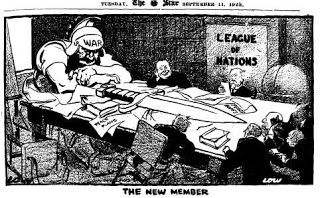Key points of this section are: (1) that the victors were totally outclassed by the German defense-team, especially Professor Hermann Jahrreiss, in knowledge of international law; (2) while the International Military Tribunal’s charter was supposed to be based on international law, no examination of the validity of that claim was allowed; (3) the IMT’s charter is clearly ex post facto law and therefore invalid; (4) the IMT’s charter presupposes a pre-existing peaceful world-order of “collective security” under the League of Nations that was well known to have been defunct long before the defendants are supposed to have shattered it.
 |
| Nice idea, but it didn’t work. |
It would be a waste of time to refute the flimsy excuses whereby one would like to justify this kind of arbitrary lawgiving. Here the old arguments are only rigidly repeated, because no one, neither among the judges nor among the prosecutors, is able to come forth to argue on the same level with the German defense-team.
That was especially evident in the clumsy attempts to respond to the argument about international law that Professor Jahrreiss, assistant defender for Senior-General Jodl, made on behalf of the whole defense. Professor Jahrreiss, the famous philosopher of law and expert on international law, holder of the Great Federal Cross of Merit (des Grossen Bundesverdienstkreuzes) since 1959, and officer of the Legion of Honor since 1961, demonstrates impressively that the German defense-team stands far above the Allied judges’ and prosecutors’ level of legal scholarship.
Because of the tribunal’s refusal on 21 November 1945 to allow the legal foundations of its charter to be reviewed in terms of international law, as Dr. Stahmer had requested, the pleading of Dr. Jahrreiss is anticipated with all the more suspense. After the experiences with Dr. Stahmer’s petition, Jahrreiss formulates his presentation with utmost prudence, while retreating not even one step from his jurisprudential position.
He refers first to the contradiction between the judges and prosecutors, because they constantly take pains to cloak their proceedings with arguments about international law, but at the same time prevent the defense from testing and refuting those pretenses about international law.
“The Charter threatens individuals with punishment for breaches of the peace between states. It would appear that the Tribunal is accepting the Charter as the unchallengeable foundation for all juridical considerations. This means that the Tribunal will not examine the question of whether the Charter, as a whole or in parts, is open to juridical objections; yet such a question nevertheless continues to exist. If this is so, why, then, have any discussion at all on the main fundamental legal problems?
“The British chief prosecutor even made an examination of the relationship of the Charter … to existing international law into the central theme of his long address.”
Presumably the British chief prosecutor had to try to maintain at least the appearance of justice before the British public.
Professor Jahrreiss affirms again however that there is a crime only where there is a violation of pre-existing laws. Only then, he said, can someone be conscious of the illegality of his action. Without this consciousness no defendant may be pronounced guilty – at least not from the point of view of the European continental conception of penal law.
“The British chief prosecutor argues as follows, if I understood him correctly:
“First, the unrestricted right of states to wage war was abolished in part by the League of Nations Covenant, later as a general principle by the Kellogg-Briand Pact, which continues to be the nucleus of world peace order to this very day. War, thus prohibited, is a punishable violation of law within and toward the community of nations, and any individual who has acted in a responsible capacity is punishable.
“Secondly, the indictment of individuals for breach of the peace, although novel, not only represents a moral necessity, but is in fact long overdue in the evolution of law; it is quite simply the logical result of the new legal position. Only in outward appearance does the Charter create new law.”
Step by step Professor Jahrreiss demolishes these seemingly so plausible arguments. He can demonstrate without difficulty that the actual historical development in every particular instance proves the opposite of what the chief prosecutor presents as irrefutable certainty. If the historical experiences offered by the decades since the Second World War had been at Dr. Jahrreiss’ disposal, his verdict on these pretenses of international law would have turned out even more devastating.
As after the First World War, so too after 1945 one had applied all possible attempts to restrain by means of paragraphs the old god of war, Mars, who has degenerated more and more into a blood-drenched demon.
 |
| The League was already seen as a failure in 1923. |
The outcome is even more negative than in the period between 1919 and 1939. The intention that already formed the basis of the charter of the League of Nations, to guarantee “eternal peace” juristically, failed after the catastrophe of 1945 even faster than the direst skeptics had feared. The arms-race and wars did not cease: in the last decades has reigned only a strife between the armistices. Nothing can show more clearly that the Nuremberg Tribunal, if it ever sincerely strove for a new world order of peace, has failed entirely.
Professor Jahrreiss explicitly professes the highest ethical aim, to prepare, instead of the sham-peace that hitherto dissolved the armistice, a real world-peace that then could also subject the breakers of the peace to an internationally valid criminal law. Indeed he also names the conditions that would have to be fulfilled to arrive at such an ideal situation:
“The tragic chain of wars and mere armistices termed peace must be broken. Sometime humanity must have the insight and the will to pass from war to real peace, that is, to peace which is good in its essence, founded on existing legal principles, without regard to victory or defeat; and this peace, which is good in its essence, must be maintained – and maintained in good condition – by an organized union of states.[1] These aims can only be achieved if the most frequent causes of war are eliminated, namely excessive armaments, secret treaties, and the consecration – detrimental to life – of the status quo as a result of lack of insight on the part of the possessor of the moment.“Humanity did not follow this path. And one should not be amazed that among those who fought against the instruments of Versailles, St. Germain, Trianon, Neuilly, and Sèvres, be it in the camp of the vanquished or in that of the victors, were the very ones who strove after real, lasting peace.”
Guilty in this development, he said, are precisely those powers whose representatives appear again today as prosecutors against Germany. Jahrreiss affirms:
“Even for the members of the League of Nations war remained a means for settling disputes, prohibited in individual cases, but normal on the whole. Jean Ray, as late as 1930, said: ‘The League of Nations did not prove to be a guide to the true order of peace, indeed it did not even prove to be a sufficient brake to prevent a complete backward movement into the former state. For the world did in fact slide back entirely’.”[2]
Again Professor Jahrreiss underscores this fact that is crucial to the foundation of this process:
“Before the commencement of the second World War the whole system of collective security, even in such scanty beginnings as it had made, had collapsed; and this collapse was acknowledged and declared expressly, or by equivalent action, by three world powers – and, in fact, declared with full justification.”
Professor Jahrreiss names in that connection Great Britain, the Soviet Union, and the USA, and demonstrates this through historical examples. That was thus in reality what was left over of the “peaceful world-order” that Shawcross had made the premise of his indictment.
“It is certain that the above-mentioned three world-powers testified at the beginning of September 1939 to the collapse – the complete collapse – and that they did not, in fact, do so as a consequence of the German-Polish war.”
Even such a prominent jurist of international law as the American Edwin Borchard asserted in 1938, thus a year before the outbreak of war, that the so-called peace-system constructed in Versailles appeared “absolutely inimical to peace, and the offspring of the hysteria of our age.”[3]
___________________________________
]1] There is a big difference here between the English-language transcript of what Jahrreiss said and what Haertle says that Jahrreiss said in German. In Haertle’s account Jahrreiss made no reference to a union of nations but said: “This however is not primarily a legal but a political task.”
[2] Jean Ray, Commentaire du Pacte de la Societe des Nations selon la Politique et la Jurisprudence des Organes de la Societe, Recueil Sirey (Paris), 1930.
[3] Edwin Borchard was a professor at Yale Law School. The quote that Haertle gives is not Borchard but Jahrreiss summarizing Borchard. The reference seems to be to Borchard’s essay, “Neutrality” dated 1 January 1938. Borchard said: “This system was pictured as the ‘new’ international law; hence all the old law that conflicted with the ideal had to be attacked as obsolete if not indeed obstructive. Neutrality, a hard-won institution which since the 16th century had served to keep a large part of the world at peace under the regulation of law, an institution which peacemakers had cherished as one of the most constructive achievements of a slowly developing civilization, fell under the ban of the ‘new’ school of peace through combined force. And so effectively did this false theory help to prevent the rebirth of the process of appeasement that the world now stands aghast before the new disasters which threaten. In a less hysterical age, the ‘new’ theory could not have gained so many adherents.” (Yale Law Journal, vol. 48: 37. 1938, p. 39)
